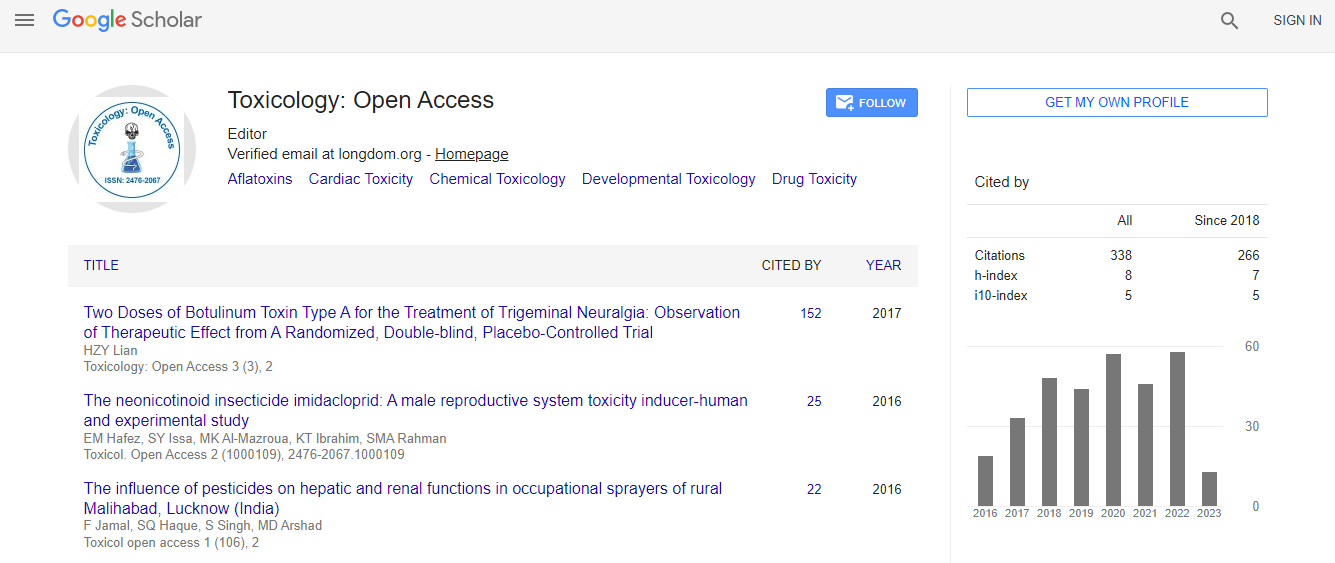Our Group organises 3000+ Global Conferenceseries Events every year across USA, Europe & Asia with support from 1000 more scientific Societies and Publishes 700+ Open Access Journals which contains over 50000 eminent personalities, reputed scientists as editorial board members.
Open Access Journals gaining more Readers and Citations
700 Journals and 15,000,000 Readers Each Journal is getting 25,000+ Readers
Google Scholar citation report
Citations : 336
Toxicology: Open Access received 336 citations as per Google Scholar report
Indexed In
- Google Scholar
- RefSeek
- Hamdard University
- EBSCO A-Z
- Geneva Foundation for Medical Education and Research
- Euro Pub
- ICMJE
Useful Links
Related Subjects
Share This Page
A comprehensive method for the screening of drugs in severely decomposed human tissues by fast gas chromatography/tandem mass spectroscopy (Fast GC-MS/MS)
14th World Congress on Toxicology and Pharmacology
Brian Waters, Kenji Hara, Natsuki Ikematsu, Mio Takayama, Aya Matsusue, Masayuki Kashiwagi and Shin-Ichi Kubo
Fukuoka University, Japan
ScientificTracks Abstracts: Toxicol Open Access
Abstract
Statement of the Problem: Drug screening is an important reference in forensic autopsy investigations. In postmortem toxicology, often the samples provided for analysis are in a severe state of putrefaction or decomposition. The presence of breakdown products such as lipids and amino acids make extraction of the compounds of interest difficult. Also, developing an analytical method capable of detecting trace levels of analytes from the interfering substances present in these complex matrices adds to the challenges. Methodology & Theoretical Orientation: For this study, putrefied and decomposing tissue samples from actual cases autopsied at our department were analyzed. Human tissue specimens consisted of liver, kidney, spleen, lung, muscle and brain, if available. The drugs detected from these specimens included phenobarbital, chlorpromazine, promethazine, aripiprazole, amlodipine, telmisartan, rosvastatine, chlorpheniramine, etizolam and zolpidem. Specimens of 0.3 g were treated with urease, acidified or alkalized and extracted with acetonitrile. Lipid-removal and solid-phase extraction cartridges were employed while carefully monitoring the pH of samples to ensure the adequate removal of interfering substances. The extracts were evaporated and reconstituted in n-propyl acetate:methanol (1:1) for fast GC-MS/MS analysis. Findings: The developed method was successful in clearly identifying drugs from putrefied specimens. The use of tandem mass spectrometry helped to reduce the influence of background noise and interfering substances. Conclusion & Significance: Putrefied specimens are often the only remaining samples left from severely decomposed cadavers. The combination of a robust preparation method and analysis with fast GC-MS/MS could aid the forensic medicine and toxicology communities in elucidating important information from these often-overlooked biological matrices. Recent Publications 1. Hara K, Waters B, Ikematsu N, et al. (2016) Development of a preparation method to produce a single sample that can be applied to both LC-MS/MS and GC-MS for the screening of postmortem specimens. Legal Medicine; 21: 85-92. 2. Waters B, Ikematsu N, Hara K, et al. (2016) GC-PCI-MS/MS and LC-ESI-MS/MS databases for the detection of 104 psychotropic compounds. Legal Medicine; 20: 1-7. References 1. Butzbach D (2010) The influence of putrefaction and sample storage on post-mortem toxicology results. Forensic Science, Medicine and Pathology; 6: 35-45. 2. Watterson J, Imfeld A, Cornthwaite H (2014) Determination of colchicine and O-demethylated metabolites in decomposed skeletal tissues by microwave assisted extraction, microplate solid phase extraction and ultra-high performance liquid chromatography (MAE-MPSPE-UHPLC). Journal of Chromatography B; 960: 145-150. 3. Wiebe T, Watterson J (2014) Analysis of tramadol and O-desmethyltramadol in decomposed skeletal tissues following acute and repeated tramadol exposure by gas chromatography mass spectrometry. Forensic Science International; 242: 261-265.Biography
Brian Waters has received his Master of Science degree in Criminalistics from California State University Los Angeles, USA. After working as a Criminalist for the County of Los Angeles, Department of Coroner/Medical Examiner for almost 8 years, he has joined as an Assistant Professor in the Department of Forensic Medicine at Fukuoka University in Japan. His specialty is postmortem forensic toxicology and he has published academic papers on fast gas chromatography-mass spectrometry, the analysis of novel psychoactive compounds, preparation methods for postmortem samples and the analysis of volatile hydrocarbons in blood.
Email:bwaters@fukuoka-u.ac.jp

 Spanish
Spanish  Chinese
Chinese  Russian
Russian  German
German  French
French  Japanese
Japanese  Portuguese
Portuguese  Hindi
Hindi 